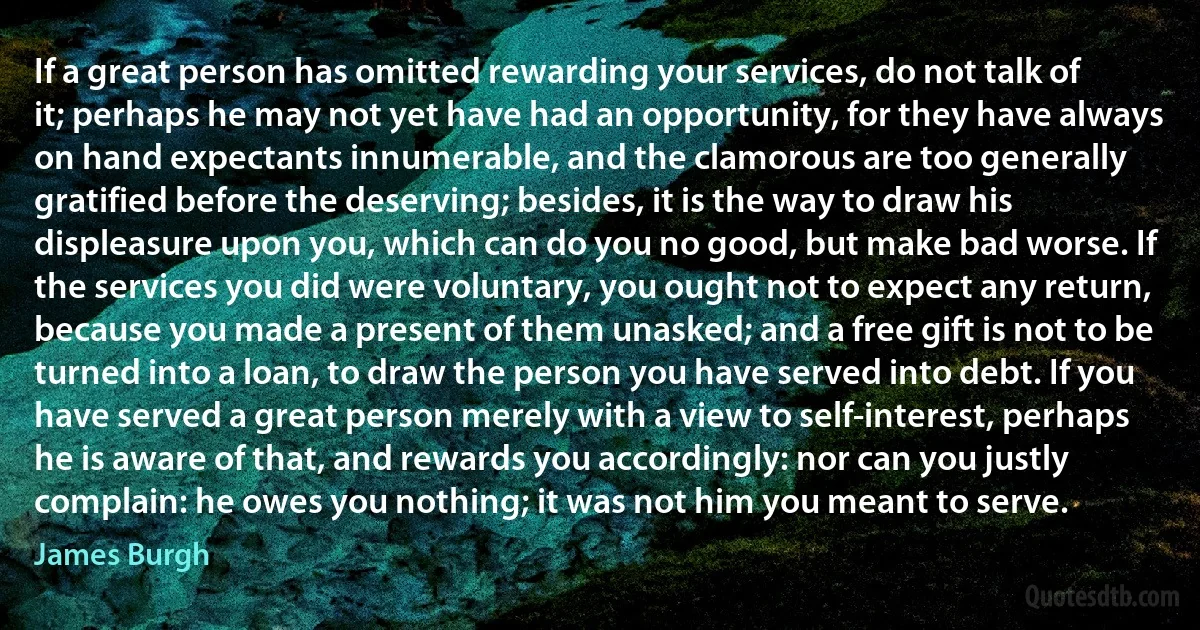
If a great person has omitted rewarding your services, do not talk of it; perhaps he may not yet have had an opportunity, for they have always on hand expectants innumerable, and the clamorous are too generally gratified before the deserving; besides, it is the way to draw his displeasure upon you, which can do you no good, but make bad worse. If the services you did were voluntary, you ought not to expect any return, because you made a present of them unasked; and a free gift is not to be turned into a loan, to draw the person you have served into debt. If you have served a great person merely with a view to self-interest, perhaps he is aware of that, and rewards you accordingly: nor can you justly complain: he owes you nothing; it was not him you meant to serve.
James BurghRelated topics
bad debt displeasure draw expect free gift good great hand loan mean nor nothing opportunity ought perhaps person present return self-interest serve talk view way worse yet owesRelated quotes
The professional administrators - especially those at higher levels - serve key roles at the boundary of the organization, between the professionals inside and interested parties - governments, client associations, and so on - on the outside. On the one hand, the administrators are expected to protect the professionals' autonomy, to "buffer" them from external pressures. On the other hand, the administrators are expected to woo these outsiders to support the organization, both morally and financially. Thus, the external roles of the manager-maintaining liaison contacts, acting as figurehead and spokesman in a public relations capacity, negotiating with outside agencies-emerge as primary ones in professional administration.

Henry Mintzberg
For what advantage is it, that the world enjoys profound peace, if thou art at war with thyself? This then is the peace we should keep. If we have it, nothing from without will be able to harm us. And to this end the public peace contributes no little: whence it is said, ‘That we may lead a quiet and peaceable life.' But if any one is disturbed when there is quiet, he is a miserable creature. Seest thou that He speaks of this peace which I call the third (inner, ed.) kind? Therefore when he has said, ‘that we may lead a quiet and peaceable life,' he does not stop there, but adds ‘in all godliness and honesty.' But we cannot live in godliness and honesty, unless that peace be established. For when curious reasonings disturb our faith, what peace is there? or when spirits of uncleanness, what peace is there?

John Chrysostom
Don't forget that God sees you and watches you when you are in pain; He perceives even the beating of your heart. Consequently, He will not leave you without consolation and His fatherly protection. Naturally, the saints rejoiced in their afflictions; as for us, let us at least manage to accept affliction or pain patiently.
My child, pray within your heart, and the name of Jesus will become for you a comforting balm so that you can bear this trial of yours in a way which benefits you. You will greatly benefit from this trial if you submit yourself to it patiently. So again I say to you, with the almighty armor of prayer continually approach the omnipotent Lord more often, and you will come to know how He wondrously lifts the burden of pain and marvellously gives rest to sufferers.

Ephraim of Arizona
Amongst the great and numerous dangers to which this country, and particularly the monarchy, is exposed in consequence of the enormous public debt, the influence, the powerful and widely-extended influence, of the monied interest is, perhaps, the most to be dreaded, because it necessarily aims at measures which directly tend to the subversion of the present order of things...I mean an interest hostile alike to the land-holder and to the stockholder, to the colonies, to the real merchant, and to the manufacturer, to the clergy, to the nobility and to the throne; I mean the numerous and powerful body of loan-jobbers, directors, brokers, contractors and farmers-general, which has been engendered by the excessive amount of the public debt, and the almost boundless extension of the issues of paper-money.

William Cobbett
For my own Part, when I am employed in serving others, I do not look upon myself as conferring Favours, but as paying Debts. In my Travels, and since my Settlement, I have received much Kindness from Men, to whom I shall never have any Opportunity of making the least direct Return. And numberless Mercies from God, who is infinitely above being benefited by our Services. Those Kindnesses from Men, I can therefore only Return on their Fellow Men; and I can only shew my Gratitude for these mercies from God, by a readiness to help his other Children and my Brethren. For I do not think that Thanks and Compliments, tho' repeated weekly, can discharge our real Obligations to each other, and much less those to our Creator.

Benjamin Franklin
